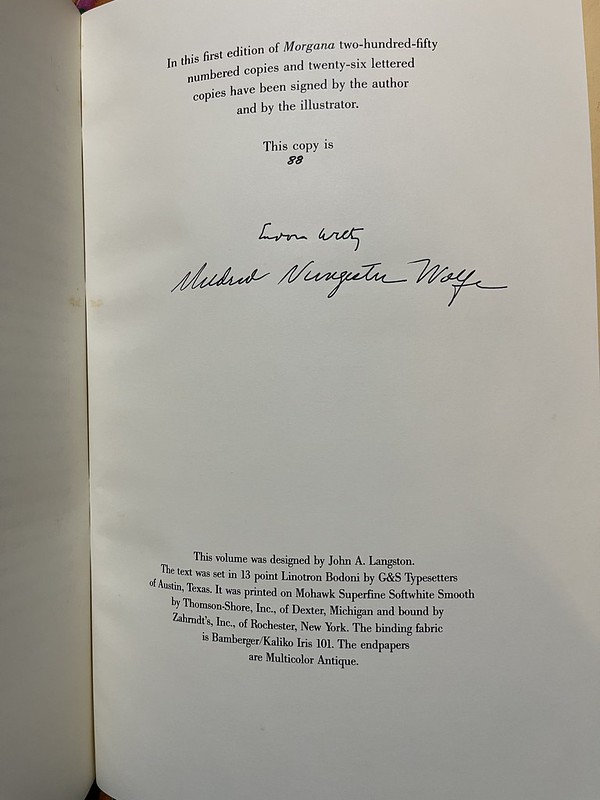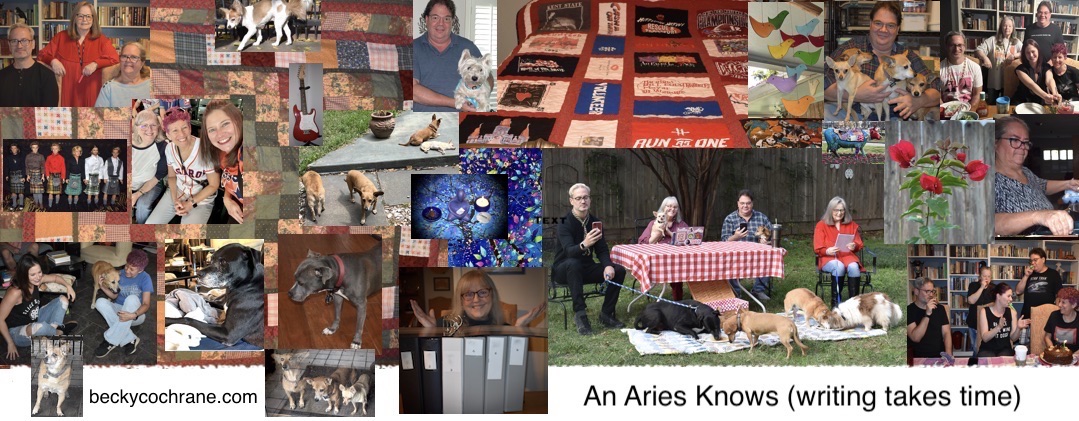When we were flooded in 2017, I lost a lot of material I’d saved from my college years, including paperwork for courses, class notes, and references I’d continued to use for many years. I decided to look at it as nature’s way of making me purge things that became less relevant as the years went by.

I think I had this particular book for a college correspondence or short-term course I took during the interim between spring and summer semesters of one of my last two years as an undergraduate, but I have no clear memory about that. Mostly I don’t remember sitting in class and hearing anyone teach the course. I suppose it’s not really relevant. In some of my other classes, I often struggled when reading a couple of Southern novelists, so I probably sought a broader sense of the literature of my region from shorter works or excerpts, and this book covered (at the time of this edition) Southern lit from 1815 to around 1968. Though I remember my favorite story from this book, I can’t really remember what other works were part of the class or what papers I wrote about them.
 After graduating from college and before I went back to graduate school a few years later, I read voraciously, trying to fill in gaps in my studies. I believe that might have been the reason I bought this beat-up paperback from a used bookstore for fifty cents. Had I read short stories by Welty in survey classes like the Southern lit class? Or did I just know she was highly recommended? I don’t remember. I did read it, and it didn’t really resonate with my reading interests of that time. In hindsight, I realize I undervalued it.
After graduating from college and before I went back to graduate school a few years later, I read voraciously, trying to fill in gaps in my studies. I believe that might have been the reason I bought this beat-up paperback from a used bookstore for fifty cents. Had I read short stories by Welty in survey classes like the Southern lit class? Or did I just know she was highly recommended? I don’t remember. I did read it, and it didn’t really resonate with my reading interests of that time. In hindsight, I realize I undervalued it.

In time, I did respect people who read a lot of Welty and talked about her work to me, and when this 1988 limited edition came into the Houston bookstore where I worked several years later, and I spotted it on the shelf, I immediately purchased it.
It’s an oversized volume tucked into a sturdy cover; here’s the title page.

More to the point, in the back you can see why it’s a real jewel: It’s limited edition, numbered, and signed by Eudora Welty and the book’s illustrator.


Then, in 1993, Geoff, a fellow Southerner who I knew through our mutual friend Steve R, gave me this for my birthday. So I had Eudora Welty material, but I still hadn’t read most of it.
 In copies of papers given to me by one of my mother’s nephews relating to his father (a writer, and one of the first who told me I could be a writer), there were a couple of copies of letters my uncle wrote to my mother. In a way that I understand all too well, he specifically mentioned Welty’s novel Losing Battles as a work that made him despair of ever being as good a writer. This so piqued my interest that I downloaded the book (this was last December), and I finally got around to reading it in April. Very long, lots of characters, and lots of stories within the narrative framework of a novel. It wasn’t an easy or fast read, but it kept me engaged.
In copies of papers given to me by one of my mother’s nephews relating to his father (a writer, and one of the first who told me I could be a writer), there were a couple of copies of letters my uncle wrote to my mother. In a way that I understand all too well, he specifically mentioned Welty’s novel Losing Battles as a work that made him despair of ever being as good a writer. This so piqued my interest that I downloaded the book (this was last December), and I finally got around to reading it in April. Very long, lots of characters, and lots of stories within the narrative framework of a novel. It wasn’t an easy or fast read, but it kept me engaged.

When I mentioned the book to a friend, she decided to read her first Welty, and she chose Delta Wedding. I downloaded it, too. Also long, but not quite as long, also full of stories within the novel’s framework, and not as challenging for me to read because I’d started adjusting to this particular style of Welty’s. And as I told my friend, and also my cousin, one joy of reading Welty now is realizing that though I am by no means comparing myself to this highly acclaimed writer, I better understand my particular style that emerged in the process of working on the Neverending Saga. I was able to take some validation from the idea that I’m being true to myself and also honoring the way many Southerners have adapted the South’s oral traditions to their writing.
All that being said, I then reread The Optimist’s Daughter, had a whole new perspective and appreciation of it, and was reminded once more why I decided to take on my current works in progress in 2019. I’ve changed so much since I first began writing these characters as a teenager, then as a young woman, then as I neared middle age. This time around, I wanted to address topics which I’d simply ignored in the past because I felt inadequate to write about them; to use narrative skills I’d grown more comfortable with from 1998 on; to recognize how age had changed what I found interesting or romantic or sexy or culturally relevant; and to write in a voice that’s more true to who I am.
We’re never too old to learn and appreciate new things about art, culture, ourselves, and our creativity.
To end on a lighter note, I saw this online and thought, “Yep. That’s Tom and me.”







 ETA: Look! When I went to return the other two books to my reference shelves, I found this very thin volume (24 pages, which means a mere 12 pieces of paper) tucked among some other books. I took pronunciation seriously! Now, I can hear native French speakers teach me pronunciations online. Students these days have no idea…
ETA: Look! When I went to return the other two books to my reference shelves, I found this very thin volume (24 pages, which means a mere 12 pieces of paper) tucked among some other books. I took pronunciation seriously! Now, I can hear native French speakers teach me pronunciations online. Students these days have no idea…
 I’m not sure what possessed me to put not one, not two, but THREE Aries characters in the Neverending Saga. I guess because I well understand the Aries nature and its range of manifestations. In my experience, Aries + Aries either tend to attract or repel–there’s no middle ground. With my characters, one is on the cusp of Taurus, one shares my birthday, and one falls only a few days after my birthday. Those last two repel each other. The Aries/Taurus character has a mostly good relationship with both of them.
I’m not sure what possessed me to put not one, not two, but THREE Aries characters in the Neverending Saga. I guess because I well understand the Aries nature and its range of manifestations. In my experience, Aries + Aries either tend to attract or repel–there’s no middle ground. With my characters, one is on the cusp of Taurus, one shares my birthday, and one falls only a few days after my birthday. Those last two repel each other. The Aries/Taurus character has a mostly good relationship with both of them.






 After graduating from college and before I went back to graduate school a few years later, I read voraciously, trying to fill in gaps in my studies. I believe that might have been the reason I bought this beat-up paperback from a used bookstore for fifty cents. Had I read short stories by Welty in survey classes like the Southern lit class? Or did I just know she was highly recommended? I don’t remember. I did read it, and it didn’t really resonate with my reading interests of that time. In hindsight, I realize I undervalued it.
After graduating from college and before I went back to graduate school a few years later, I read voraciously, trying to fill in gaps in my studies. I believe that might have been the reason I bought this beat-up paperback from a used bookstore for fifty cents. Had I read short stories by Welty in survey classes like the Southern lit class? Or did I just know she was highly recommended? I don’t remember. I did read it, and it didn’t really resonate with my reading interests of that time. In hindsight, I realize I undervalued it.



 In copies of papers given to me by one of my mother’s nephews relating to his father (a writer, and one of the first who told me I could be a writer), there were a couple of copies of letters my uncle wrote to my mother. In a way that I understand all too well, he specifically mentioned Welty’s novel Losing Battles as a work that made him despair of ever being as good a writer. This so piqued my interest that I downloaded the book (this was last December), and I finally got around to reading it in April. Very long, lots of characters, and lots of stories within the narrative framework of a novel. It wasn’t an easy or fast read, but it kept me engaged.
In copies of papers given to me by one of my mother’s nephews relating to his father (a writer, and one of the first who told me I could be a writer), there were a couple of copies of letters my uncle wrote to my mother. In a way that I understand all too well, he specifically mentioned Welty’s novel Losing Battles as a work that made him despair of ever being as good a writer. This so piqued my interest that I downloaded the book (this was last December), and I finally got around to reading it in April. Very long, lots of characters, and lots of stories within the narrative framework of a novel. It wasn’t an easy or fast read, but it kept me engaged.
